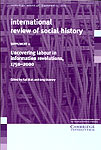Volume 48 supplement 11 (2003)
Contents

Uncovering Labour in Information Revolutions, 1750-2000
Most discussions of the present-day Information Revolution are focused on the technological developments in the realm of information and communication, and tend to overlook both the human labour involved in the development, maintenance and daily use of these information and communication technologies (ICTs), and the consequences of the implementation of these ICTs for the position and divisions of labour.
This volume aims to redress this imbalance by exploring the role, position and divisions of information and communication labour in the broadest sense through periods of revolutionary technological change. With contributions on a variety of geographies in this latest as well as in earlier information ages, this collection offers a comparative insight into the continuities and discontinuities in information revolutions.
Articles
Aad Blok, Introduction
Eve Rosenhaft, Hands and Minds: Clerical Work in the First "Information Society"
Deep Kanta Lahiri Choudhury, India's First Virtual Community and the Telegraph General Strike of 1908
Aristotle Tympas, Perpetually Laborious: Computing Electric Power Transmission Before the Electronic Computer
Bernard Dubbeld, Breaking the Buffalo: The Transformation of Stevedoring Work in Durban between 1970 and 1990
Helen Sampson and Bin Wu, Compressing Time and Constraining Space: The Contradictory Effects of ICT and Containerisation on International Shipping Labour
Nathan L. Ensmenger, Letting the "Computer Boys" Take Over: Technology and the Politics of Organizational Transformation
Chris Benner, "Computers in the Wild": Guilds and Next Generation Unionism in the Information Revolution
Hector Postigo, Emerging Sources of Labor on the Internet: The Case of America Online Volunteers
Greg Downey, Commentary: The Place of Labor in the History of Information Technology Revolutions
